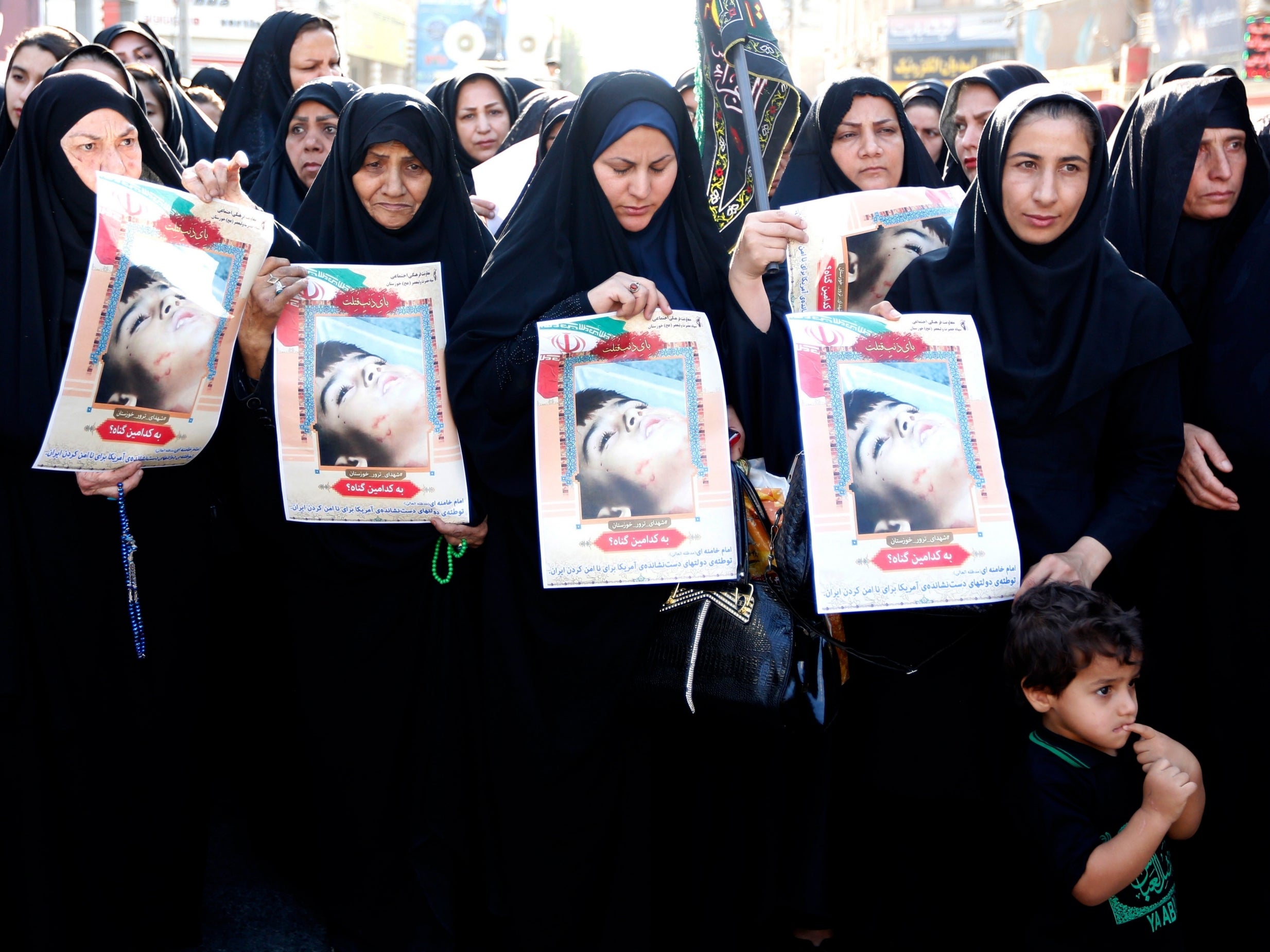Iran mourns terror attack victims, as confusion swirls over Isis's claim of responsibility
The men in the Isis video, speaking Arabic and Persian, never mention Isis or make a religiously valid oath loyalty to the group

Your support helps us to tell the story
From reproductive rights to climate change to Big Tech, The Independent is on the ground when the story is developing. Whether it's investigating the financials of Elon Musk's pro-Trump PAC or producing our latest documentary, 'The A Word', which shines a light on the American women fighting for reproductive rights, we know how important it is to parse out the facts from the messaging.
At such a critical moment in US history, we need reporters on the ground. Your donation allows us to keep sending journalists to speak to both sides of the story.
The Independent is trusted by Americans across the entire political spectrum. And unlike many other quality news outlets, we choose not to lock Americans out of our reporting and analysis with paywalls. We believe quality journalism should be available to everyone, paid for by those who can afford it.
Your support makes all the difference.Isis released a video purporting to show the militants who staged the deadly 22 September attack on a military parade in the Iranian city of Ahvaz, adding to confusion about responsibility for an attack which left 29 people dead and 53 injured.
Iran officials have called for retribution for the attack, as its ramifications reverberated throughout the country and the region. "Revenge Time,” blared the headline on the front page of the conservative daily paper, Siyasat-e Ruz.
Iran’s state television broadcast footage of the victims’ funerals and declared Monday a nationwide day of mourning.
“All people across the country are upset and worried about this attack,” Mahdi Khalili, a reformist politician and analyst based in Tehran, told The Independent.
“The whole nation is in mourning and condemns this attack.”
Iran’s president, Hassan Rouhani, en route to New York for the UN General Assembly gathering, was quoted as saying the attack was "Americans' work.” Other Iranian political and military officials blamed Saudi Arabia and the United Arab Emirates.
The Iranian foreign ministry summoned UAE diplomats to berate them over comments by a political scholar that appeared to justify the attack by insisting the target was legitimate. "An attack on a military target is not a terrorist act,” wrote Abdul Khaleq Abdullah. “Moving the battle to deep inside Iran is an option that has been publicly declared and will increase in the coming phase.”
An Arab Iranian separatist group, Ahvaz National Resistance, believed to receive support from Tehran’s Persian Gulf rivals, originally claimed to have been behind the attack.
Among the victims were children, a journalist, and at least 10 members of Iran’s Islamic Revolutionary Guard Corps (IRGC), a parallel branch of the armed forces.
The three men in the Isis video, speaking Arabic and Persian, never mention Isis or make a religiously valid oath loyalty to the group, which terrorism experts consider unusual.
Though the video carried the imprimatur of Isis’s Amaq news platform and was distributed through its normal channels on the Telegram messaging app, some Iranians on social media said photos of the corpses did not match the figures on the video.
The attack was the most significant act of terror inside the country since last year, when Isis militants killed 17 people at the parliament and at the shrine of Ayatollah Ruhollah Khomeini, founder of Iran’s Islamic system, in Tehran.
Iran's minister of intelligence said Monday a number of individuals tied to the attack had been rounded up, while the perpetrators were dead.
"The terrorists who carried out the attack were killed, and the rest of them - to the last man - will be identified,” he said at a funeral for the victims of the attack, according to the ISNA news agency. "We will punish every single one of the terrorists for their actions."
Iran very likely will not directly retaliate for the attack. But the widespread perception in Iran that the US and its allies were upping support for militant groups along its borders adds to existing pressure on Tehran to challenge Washington’s aims in other venues, including Iraq, Syria, and Afghanistan.
“Iran may now strengthen the Taliban, and consequently the war in Afghanistan will further intensify,” military expert Atiqollah Amarkhel, told the Shamsad news channel in Kabul on Sunday.
For now Mr Khalil said the Iranian leadership would pursue diplomatic means of pressure, with Mr Rouhani likely speaking about the attack at the General Assembly this week.
The secretary of Iran's powerful Expediency Council, Mohsen Rezaee, called on Mr Rouhani’s government to demand that Denmark, Netherlands and the UK hand over "terrorists” within their borders affiliated with the organisation.
The UK hosts a Persian-language Iranian exile satellite television station that broadcast an interview with a leader of the separatist group shortly following the attack.
Join our commenting forum
Join thought-provoking conversations, follow other Independent readers and see their replies
Comments